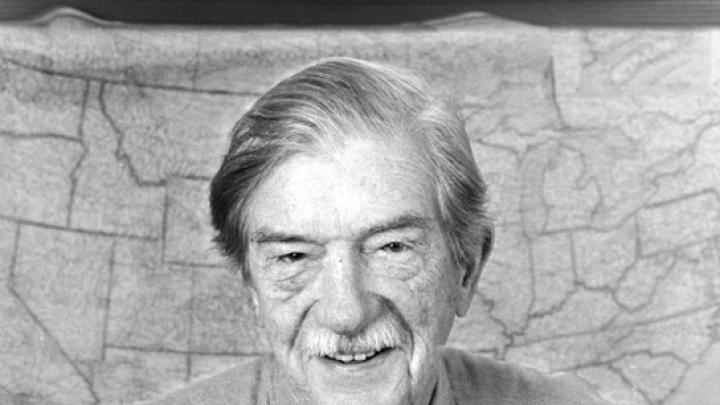“What was most striking about Sam as a teacher was his lack of egotism,” said Melvin Richter ’43, Ph.D. ’53, at a memorial service in October for Samuel Hutchison Beer, Ph.D. ’43, LL.D. ’98, the late Eaton professor of the science of government emeritus. “In every discussion, he sought not to display or defend the superiority of his own views, but to develop something different from and superior to them.”
Richter spoke specifically about Social Sciences 2, the course that Beer invented and then taught for three decades. More than 10,000 students took it, and some 150 graduate students served as his teaching fellows. Richter was one of those TFs; he is now professor of political science at the City University of New York Graduate Center and Hunter College.
The course, said Richter, “was Sam’s synthesis of his education as historian and political theorist when a Rhodes Scholar at Oxford, and his evolution after 1945 into a social scientist and leading analyst of British and comparative politics. When invited to create one of the original General Education courses, he devised a strikingly original format. In my day, students in each of their six papers were asked to choose between two alternative general theories that might explain a historical case, such as Marx and Max Weber on the origins of capitalism. Students learned about the facts of each case from reading documents written during the period being studied. The first case was the conflict between Henry II and Thomas à Becket; the last, the rise of the Nazis and the horrors of their regime.
“Every week,” said Richter, “Sam gave two formal lectures setting out the alternative theories being considered. Sam’s presentations, first of one theorist and then the other, were so powerful and convincing that students were in turn persuaded by each of them. Sam’s own preferences never entered into his exposition, which first stressed the power of the argument in question, and then challenged the evidence supporting it, and the rigor of its reasoning....For Sam, the point of research and analysis was to provide good reasons for choosing between plausible alternatives, rather than seeking the one correct choice.”
May we each hope to think so sensibly—and our leaders in Washington, as well.
Say what: A deft hand with the written word is a priceless asset for a fundraiser. A pioneer in the eleemosynary line was Robert F. Duncan, A.B. 1912, a founder with John Price Jones ’08 of the first professional fundraising firm, the John Price Jones Corporation, which helped Harvard hold its hand out in the early 1920s. Duncan’s son Donald C. ’49, for 47 years a math teacher at Milton Academy and now retired in Southport, Maine, is writing reminiscences of his father. One concerns a bit of sage advice dispensed a century ago that no doubt sharpened the incipient fundraiser’s persuasive skills:
“Dad used to tell of what he felt was the best advice he ever had on good writing. One of his professors was the legendary Charles Townsend Copeland, A.B. 1882, Boylston professor of rhetoric and oratory. Copeland didn’t collect themes and grade them. Rather, he made an appointment with each student to come to his quarters in Hollis Hall to read his theme and receive comments from the Master. Dad arrived as scheduled one evening and was ushered to a chair at a small table with a gooseneck lamp in the middle of the room. Copeland turned on the lamp, turned off the other lights in the room, and prowled unseen in the darkness. After a long silence he said, ‘Mr. Duncan, you may begin.’
“Dad started to read his offering and heard occasional groans and sighs of anguish from various locations in the darkness. Finally, Copeland said in pained tones, ‘Stop, Mr. Duncan, stop.’ Dad stopped. After several seconds of deep silence, Copeland asked, ‘Mr. Duncan, what are you trying to say?’ Dad explained what he was trying to say. Said Copeland, ‘Why didn’t you write it down?’”









